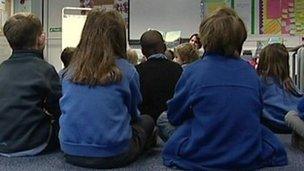Lotteries 'used more' to decide on school places
- Published

Parents in England will soon find out to which state secondary their children have been allocated
More schools in England are using lotteries or "banding" pupils by ability to allocate places, an educational charity says.
The number using the methods - intended to get a broad mix of pupils - is small but growing, says the Sutton Trust.
With the "banding" method, schools take some pupils from each ability group.
The trust says the growth is because more schools are becoming academies - state-funded but independent schools that can set their own admission rules.
Some schools use both lotteries and banding systems.
'Balanced intake'
According to research for the Sutton Trust, carried out by the London School of Economics, the number of schools using banding increased from 95 in 2008 to 121 in the past academic year.
On top of that, 42 schools were using lotteries - also known as random allocation.
However, there are more than 20,000 schools in England, so as a proportion, the numbers are small.
Conor Ryan, from the Sutton Trust, said: "It is encouraging that more schools and academies are using banding and ballots as a way to get a more balanced intake.
"Access to the most popular comprehensives should not be limited to those who can afford to pay a premium on their mortgages or rents.
"We believe that more urban schools should use such methods, but for them to be most effective, they should develop them in partnership with other schools and local authorities."
There have been claims that some high-performing state schools are dominated by middle- and high-income groups.
Earlier research by the charity said the proportion of children on free school meals in top comprehensives was far below the national average.
'Disgusting'
Its report calls for more schools to introduce ballots or banding systems and suggests that where banding is used, a common test should be developed for all schools in a particular area so that pupils only have to sit one paper.
But some parents are unhappy with the idea of their child's school place being left to chance.
Campaign group Parents Outloud is against the use of lotteries.
Founder Margaret Morrissey said: "To reduce our education system to a lottery system to provide school places is disgusting. Children and parents deserve better".
She said she was tired of hearing about "middle-class strangleholds" and that every parent had the same right to want what was best for their child.
"This will cause many knock-on effects with regard to travel and practicality of taking a family to more than one school if you do not have school places in your area," she said.
"And children thrive having other school friends who live near them."
Siobhan Freegard, founder of the Netmums parenting website said many parents felt this type of lottery was one they could only lose, not win.
"Though lotteries may look like a fair way to allocate places, they can end up making the situation worse," she said.
"And parents with several children may end up with them scattered at different schools."
Next week, parents of 10- and 11-year-olds in England will find out at which state secondary school their child has been given a place.
Lotteries and banding systems are used in schools that are very over-subscribed, particularly in London.
Schools that set their own admissions rules have to follow guidelines set by the government, aimed at ensuring systems are fair, which are known as the Admissions Code.
Oxbridge applicants
Dunraven School in Streatham, London, uses banding.
Principal David Boyle said: "We started banding to make sure we had a properly comprehensive intake at our school.
"We wanted to represent the area we serve and that's only possible if our student body reflects the ability range in our area.
"Banding has not stopped us being a community school, it's made us a better school for our community.
"Everyone is better off now - we cater for Oxbridge applicants as much as those who face educational challenges."
A spokesman for the Department for Education said: "More and more parents have the choice of a good school place thanks to our reforms - the number of children in failing secondary schools has fallen by a quarter of a million since 2010.
"The new Admissions Code is clear that all school places should be allocated in a fair and transparent way."
The NASUWT teaching union says allowing schools to determine their own admissions policies "leads to a chaotic system in which children, families and the taxpayer may lose out".
General secretary Chris Keates said: "Whilst selecting pupils on the basis of banding or a lottery may seem, at first glance, fair and attractive, it masks a number of potentially adverse consequences in a system in which there is a free for all for schools to set their own admissions arrangements.
"What is needed is an overarching, coordinating body, a role traditionally played by local authorities, to ensure fair admissions across a large area."
- Published18 December 2013
- Published29 November 2013
- Published29 November 2012
- Published3 September 2010